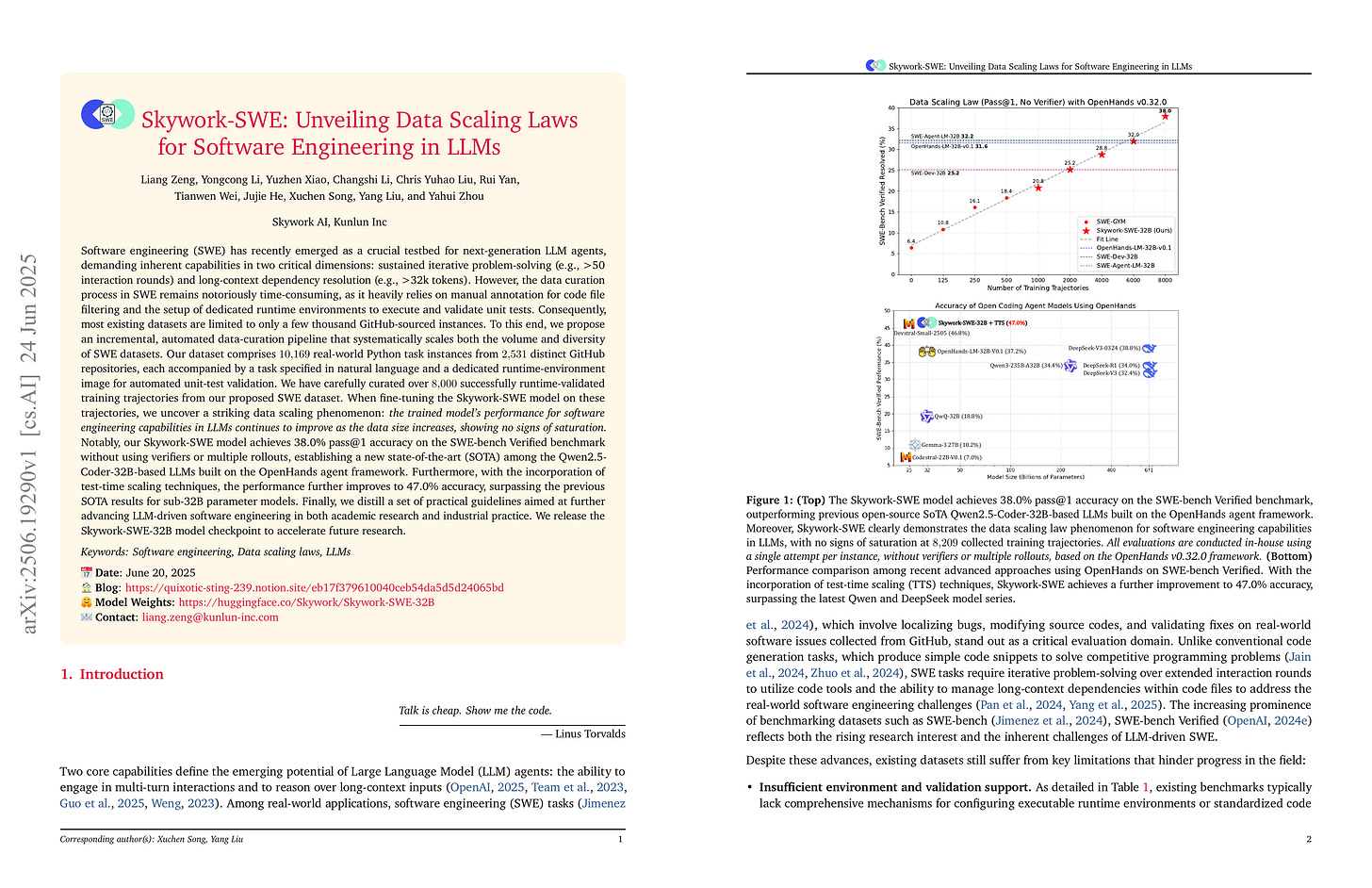2025년 6월 25일
SRFT: A Single-Stage Method with Supervised and Reinforcement Fine-Tuning for Reasoning
(Yuqian Fu, Tinghong Chen, Jiajun Chai, Xihuai Wang, Songjun Tu, Guojun Yin, Wei Lin, Qichao Zhang, Yuanheng Zhu, Dongbin Zhao)
Large language models (LLMs) have achieved remarkable progress in reasoning tasks, yet the optimal integration of Supervised Fine-Tuning (SFT) and Reinforcement Learning (RL) remains a fundamental challenge. Through comprehensive analysis of token distributions, learning dynamics, and integration mechanisms from entropy-based perspectives, we reveal key differences between these paradigms: SFT induces coarse-grained global changes to LLM policy distributions, while RL performs fine-grained selective optimizations, with entropy serving as a critical indicator of training effectiveness. Building on these observations, we propose Supervised Reinforcement Fine-Tuning (SRFT), a single-stage method that unifies both fine-tuning paradigms through entropy-aware weighting mechanisms. Our approach simultaneously applies SFT and RL to directly optimize the LLM using demonstrations and self-exploration rollouts rather than through two-stage sequential methods. Extensive experiments show that SRFT achieves 59.1% average accuracy, outperforming zero-RL methods by 9.0% on five mathematical reasoning benchmarks and 10.9% on three out-of-distribution benchmarks.
SFT와 RL을 결합해서 같이 학습하자는 아이디어. 엔트로피 관점에서 접근하고 있어서 엔트로피를 다른 방법으로 통제하면 어떨지 궁금하네요. SFT 데이터를 부트스트래핑 하는 경우에도 차이가 있을 수 있겠죠.
This paper presents the idea of combining SFT and RL for joint training. As it approaches the problem from an entropy perspective, I'm curious about how the results might change if we control entropy in different ways. Additionally, there could be differences if we bootstrap the SFT data.
#rl #reasoning
Skywork-SWE: Unveiling Data Scaling Laws for Software Engineering in LLMs
(Liang Zeng, Yongcong Li, Yuzhen Xiao, Changshi Li, Chris Yuhao Liu, Rui Yan, Tianwen Wei, Jujie He, Xuchen Song, Yang Liu, Yahui Zhou)
Software engineering (SWE) has recently emerged as a crucial testbed for next-generation LLM agents, demanding inherent capabilities in two critical dimensions: sustained iterative problem-solving (e.g., >50 interaction rounds) and long-context dependency resolution (e.g., >32k tokens). However, the data curation process in SWE remains notoriously time-consuming, as it heavily relies on manual annotation for code file filtering and the setup of dedicated runtime environments to execute and validate unit tests. Consequently, most existing datasets are limited to only a few thousand GitHub-sourced instances. To this end, we propose an incremental, automated data-curation pipeline that systematically scales both the volume and diversity of SWE datasets. Our dataset comprises 10,169 real-world Python task instances from 2,531 distinct GitHub repositories, each accompanied by a task specified in natural language and a dedicated runtime-environment image for automated unit-test validation. We have carefully curated over 8,000 successfully runtime-validated training trajectories from our proposed SWE dataset. When fine-tuning the Skywork-SWE model on these trajectories, we uncover a striking data scaling phenomenon: the trained model's performance for software engineering capabilities in LLMs continues to improve as the data size increases, showing no signs of saturation. Notably, our Skywork-SWE model achieves 38.0% pass@1 accuracy on the SWE-bench Verified benchmark without using verifiers or multiple rollouts, establishing a new state-of-the-art (SOTA) among the Qwen2.5-Coder-32B-based LLMs built on the OpenHands agent framework. Furthermore, with the incorporation of test-time scaling techniques, the performance further improves to 47.0% accuracy, surpassing the previous SOTA results for sub-32B parameter models. We release the Skywork-SWE-32B model checkpoint to accelerate future research.
SWE 데이터셋. 여기서는 궤적을 다른 LLM으로 생성했는데 그래도 보통 일이 아니네요.
A SWE dataset. Although they generated trajectories using external LLMs, it's still an impressive undertaking.
#dataset
JoyAgents-R1: Joint Evolution Dynamics for Versatile Multi-LLM Agents with Reinforcement Learning
(Ai Han, Junxing Hu, Pu Wei, Zhiqian Zhang, Yuhang Guo, Jiawei Lu, Zicheng Zhang)
Multi-agent reinforcement learning (MARL) has emerged as a prominent paradigm for increasingly complex tasks. However, joint evolution across heterogeneous agents remains challenging due to cooperative inefficiency and training instability. In this paper, we propose the joint evolution dynamics for MARL called JoyAgents-R1, which first applies Group Relative Policy Optimization (GRPO) to the joint training of heterogeneous multi-agents. By iteratively refining agents' large language models (LLMs) and memories, the method achieves holistic equilibrium with optimal decision-making and memory capabilities. Specifically, JoyAgents-R1 first implements node-wise Monte Carlo sampling on the behavior of each agent across entire reasoning trajectories to enhance GRPO sampling efficiency while maintaining policy diversity. Then, our marginal benefit-driven selection strategy identifies top-K sampling groups with maximal reward fluctuations, enabling targeted agent model updates that improve training stability and maximize joint benefits through cost-effective parameter adjustments. Meanwhile, JoyAgents-R1 introduces an adaptive memory evolution mechanism that repurposes GRPO rewards as cost-free supervisory signals to eliminate repetitive reasoning and accelerate convergence. Experiments across general and domain-specific scenarios demonstrate that JoyAgents-R1 achieves performance comparable to that of larger LLMs while built on smaller open-source models.
멀티 에이전트를 RL로 학습. 최근 Noam Brown이 팟캐스트에서 멀티 에이전트에 대해 언급해서 관심이 가네요. 기존의 접근과는 다른 멀티 에이전트에 대한 접근이 뭘까요.
Training multi-agents with RL. This caught my interest as Noam Brown recently mentioned multi-agents in a podcast. I wonder what new approaches to multi-agents he discussed that differ from existing methods.
#agent #rl #reasoning








